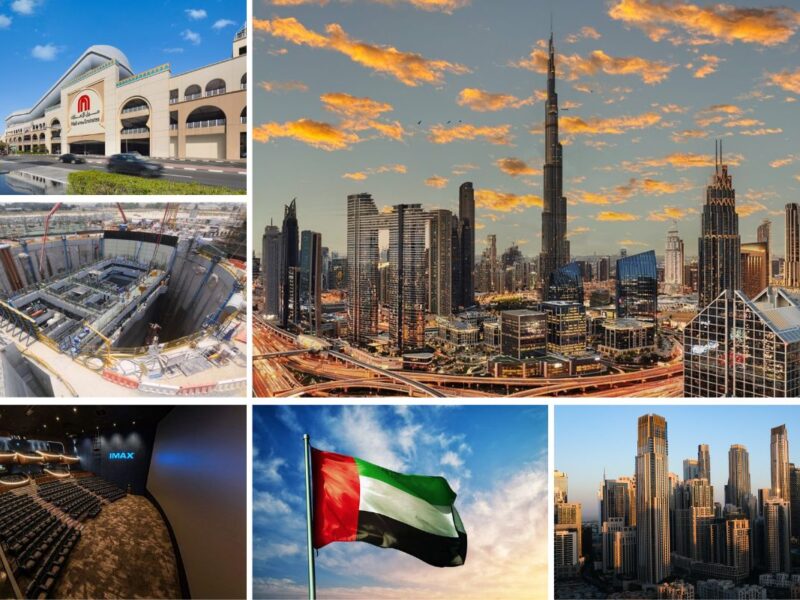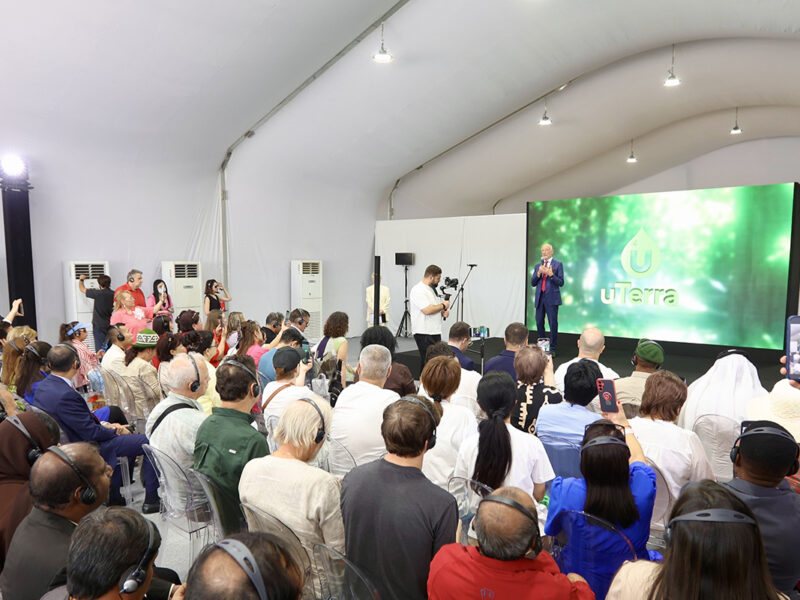Vishesh Bhatia began work for the Al Futtaim Group in 1978. Well-acquainted with most of his front-of-house staff and armed with a wealth of knowledge about the firm’s development, his lengthy period of service certainly shows.
From the comfort of his Festival Tower offices, which boast an impressive view of the Dubai skyline, the director of electronics and real estate says he is very excited about the year ahead. Not only is he expecting to see growth in some areas following the challenging post-recession years, but he is also plotting the overhaul of the group’s flagship shopping mall in its multi-billion dollar Dubai Festival City development.
“The mall is about five years old, it needs a refresh,” he says. “In the next six months, you will see substantial activity in this direction. It will be phased, so some things will be done immediately — small things like improving lighting and navigation around the mall — and then there are the more structural [changes], which will take a bit longer.
“It will probably take us 24 months before we finish the whole thing. Part of our mall is less occupied than it should be, so we’re also talking to some new retailers to see if they would be interested to come here.”
He declines to specify how much would be spent on the upgrade, but remarks on how the investment will be significant, and certainly in the region of millions of dirhams. He says the plan is to do “exciting things” in a bid to boost the number of shoppers.
“This is a major refresh. The group is prepared to invest. It will not be insubstantial. You can’t just refresh by spending AED1m.”
Retail property analysts would say he has the right idea. Despite reports of a retail boom for the industry’s heavyweights, many experts have referred to the emergence of a two-tier retail market in Dubai as the competition heats up, with a glut of prime retail space pushing out some of the older malls and forcing them to slash rental rates.
Bhatia says the Festival City mall remains attractive due to the large number of food and beverage outlets, abundance of free parking and new promenade, but could use some changes in certain areas to improve the visitor experience and support retailers’ sales programme. One important part of the upgrade will be to add more entertainment aspects, which should increase dwell time in the mall.
“We actually have a very strong food and beverage offering, we have close to 80 F&B outlets, that’s a lot. Some are doing very well, Hard Rock Cafe is one. But we need to have an entertainment aspect. We are looking for people with experience and background to come into our organisation and give this fresh impetus.”
The retail environment, in the meantime, is likely to remain challenging for some brands, but Bhatia makes clear the group’s intentions are to help stores where possible. “Some do very well; some not so well. That’s not atypical of this kind of business. There is no doubt there is pressure on lease rates. When business goes down, shops look for support on the rental rates, because these are one of the largest costs other than manpower. We help retailers of course. We keep looking at [rents].”
As for the rest of Festival City, Al Futtaim is taking its time finishing construction of the masterplan, which was halted in the wake of the economic downturn due to a widespread slowdown in the emirate’s property market. As it stands, the site currently boasts a wave of residential space, two commercial towers (including Festival Tower), two hotels (the Intercontinental and the Crowne Plaza), two schools, an automotive showroom park, a golf course and a shopping mall. It is likely to see further development in the future in areas where it makes good commercial sense, with plans for more residential buildings next on the agenda.
“What we’ve built so far is about 35 to 40 percent of the total masterplan, so there is still a long way to go,” says Bhatia. “We have just built our first building in our business park which is now occupied fully, and also another 24 villas. We have plans to build more, absolutely. As we speak we are busy rolling out more residences. We are looking at doing two small apartment blocks behind the villa complex next to the golf course. The plan is for between 70 and 150 apartments, and we are also looking at more villas.”
Article continued on next page
Initially the group only leased the units, but has since announced plans to commence its residential sales programme. “[We didn’t sell before] because we needed the title deeds, but the intention was always there. The market was also not right for selling in 2009, 2010 and 2011, but it’s beginning to pick up now. There’s appetite to buy here. We made our first sale recently, and we have a list of about 20 other buyers in the pipeline.”
On the commercial side, Al Futtaim has no immediate plans to invest in new buildings given the market conditions for office property, but says there could be some opportunities further down the line. “I think we will wait and see,” says Bhatia. “Commercial space generally in Dubai is grossly oversupplied, so we need to be careful. But our hotels are expected to do much better this year. We had a great start in January and February — all our numbers are up.”
Outside of Dubai, he hints that two operators for hotel properties in Doha Festival City have finally been signed, but keeps those names to himself while negotiations remain in the final stages. The $1.65bn project, which will cover more than 430,000 sq m and is due for completion at the end of 2014, is right on schedule, he says, with the new Ikea set for launch at the end of this year and talks ongoing with a number of high-profile brands for retail and entertainment deals.
“We are in conversations with lots of people in the retailing business [for Doha]. It will be a premium mall, with a very large entertainment portion, and we are looking at options from all over the world for something new and exciting. At this point in time, we don’t want to say any more.”
He also remains mute on the topic of the 3 million sq m Cairo Festival City, the company’s flagship real estate development in Egypt which came under scrutiny along with other developments in the wake of former president Hosni Mubarak’s ousting. According to a report by Bloomberg, an Egyptian government commission has recently approved the settlement of the dispute with Al Futtaim Group, in a deal which provides for the company to fund the difference between the price it paid for land under the old administration, and the value deemed fair by the current authorities.
Bhatia declines to comment, but stresses his positive outlook for the next ten months. The division, which saw a slight dip in profits last year, is eyeing a steadier 2012 as the markets pick up and cutbacks within the company begin to take effect. “Real estate will probably be steady this year. Last year, we were running at revenues broadly the same as the year before, but at the EBITDA level we were marginally below [2010], really because of utility costs, which skyrocketed.”
In a bid to slash overheads, the firm has since been keeping close tabs on electricity and water use across the entire development from a centralised system, which Bhatia says is also helping to minimise carbon dioxide emissions. Using 2009 as a base year, the group has already achieved a reduction of 20.6 percent in kilowatt hour (KwH) consumption last year, and is targeting a further 20 percent reduction in 2012.
Al Futtaim Electronics, which is a completely different branch of the business albeit still under Bhatia’s remit, also has targets in mind. The division, which manages the regional distribution of electronics products by Panasonic, Toshiba, Sanyo, its own brand Aftron and more recently Nokia, is forecasting twelve percent growth for the year.
“We have to have a very large logistics centre, and we have about 400 channel partners such as Carrefour, Lulu and Dubai Duty Free, and every day we have orders from them,” says Bhatia. “The year 2011 was slightly better than 2010 and this year we are hoping to do better again. Nokia [which is new] was quite a big win for us, and we’re quite proud of that.”
Asked about plans for new projects, either on the electronics side or the real estate side, Bhatia doesn’t rule out the prospect, but says the focus for the year ahead will be to incorporate existing assets and services rather than launching new ones. On the real estate side particularly, he says the need for integration is crucial. “At the moment there is nothing on the horizon,” he says. “But if the opportunity arises [for a new project] in the GCC we would look at something.”








